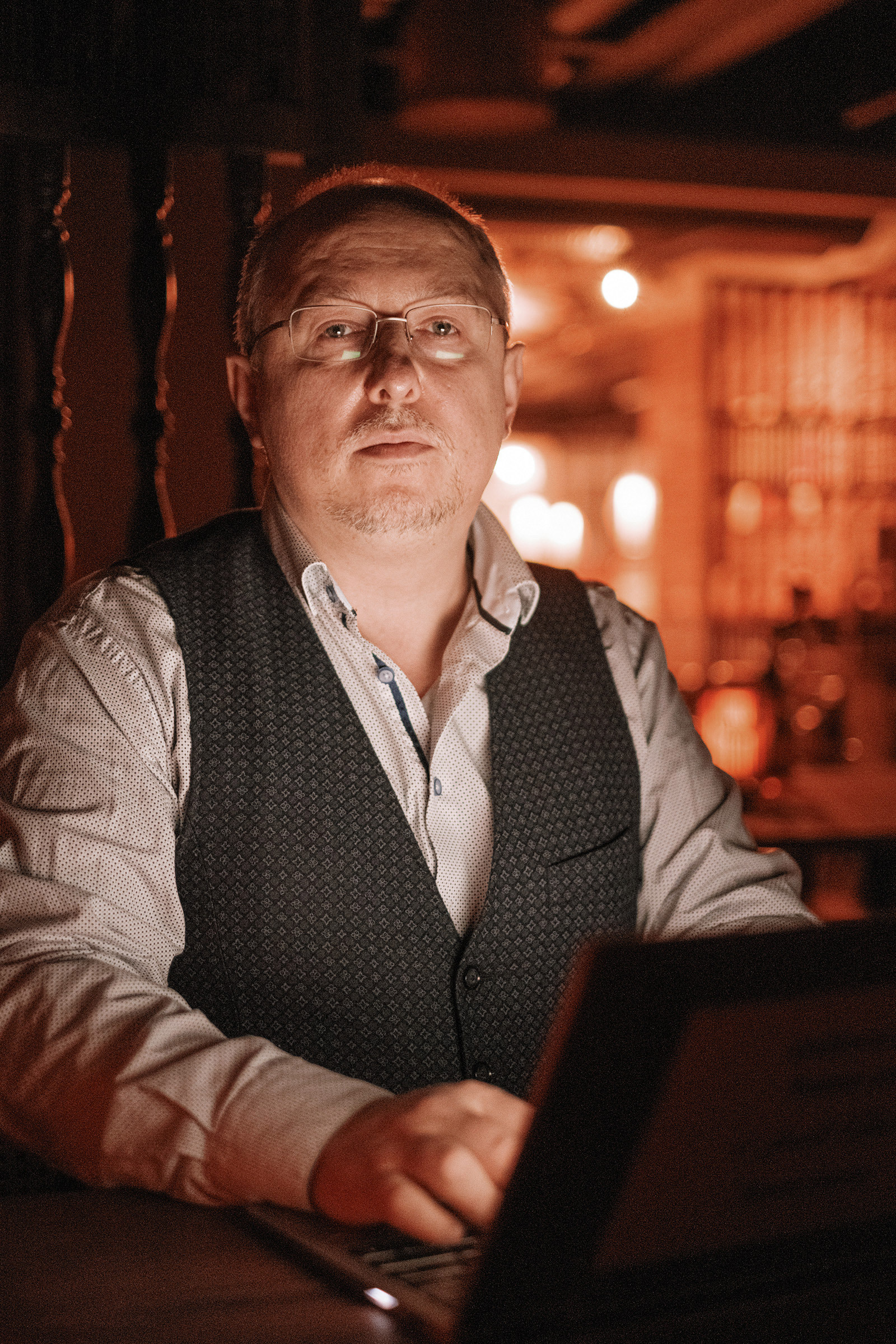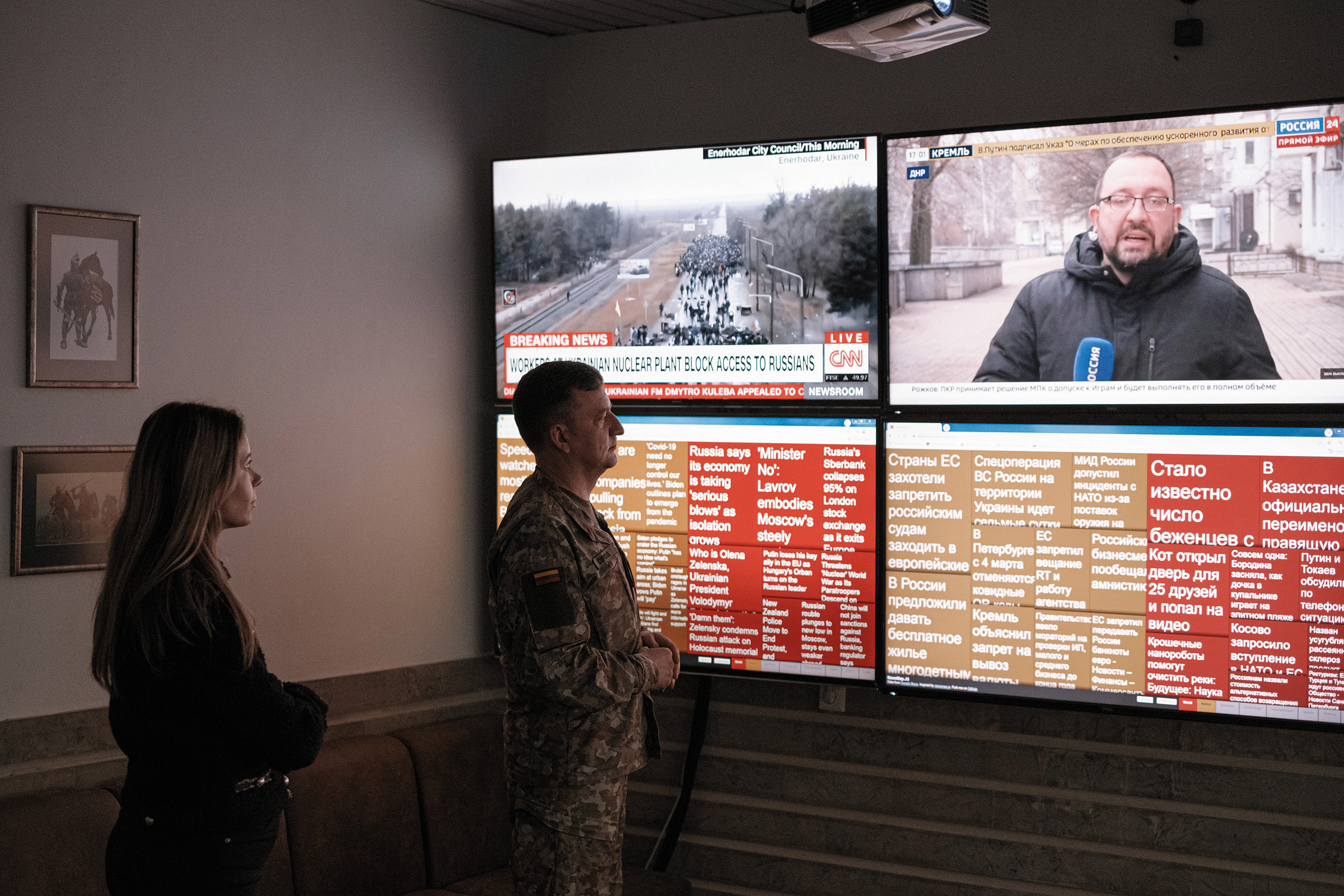
On the day that Russia began its expanded invasion of Ukraine, Henrikas Savickis was preparing to open a new play. An actor at the National Theater in the Lithuanian city of Kaunas, the 51-year-old was caught up in dress rehearsals, but still managed to squeeze in a small contribution to the fight against Russia. After logging on to a private Facebook group seemingly devoted to Yorkshire puppies, he took up his weapon of choice—the keyboard—and began correcting and reporting the lies he saw.
The Yorkshire puppies are a cover for a large, informal community of Lithuanian citizens who, for the past eight years, have been engaged in an ongoing battle against the Russian disinformation that regularly floods Lithuanian media, social and otherwise. The group’s members number in the thousands, and although most keep their identities secret, they include bartenders, doctors, students, businesspeople, and at least one member of the Lithuanian parliament. And although they go by the whimsical name of “elves,” they are a serious part of a broader coalition across different levels of society that have made Lithuania a leader in that other war against Russia: the information war.
Read More: How Putin Is Losing at His Own Disinformation Game in Ukraine
They got their name, says their founder Ricardas Savukynas, “because elves fight trolls.” Working alone, and meeting only in the virtual space of Facebook groups, they jump into action whenever one member identifies a piece of fake news or a number of fake accounts that seem to be the clear product of Russian troll farms. By reporting the disinformation en masse to the platform they eventually generate enough complaints to have it removed by Facebook. (Facebook did not reply to TIME’s request for comment by the time of publication.)
And for all its simplicity, the method has proven effective enough that Lithuania’s Ministry of Defense has recommended it as an alternative to young men eager to join the fight to defend Ukraine but who lack the military experience necessary to do so, according to two who spoke to TIME.

The world has awoken in the last few years to the threat of Kremlin-backed fake news and disinformation. From the manipulation of elections in the United States, to the spread of anti-vax conspiracies during the pandemic, to the casting of the Ukraine war as a “special military option” designed to “liberate” the country, it has become increasingly clear just how eager the Putin regime is to spread distorted facts, lies, and propaganda in its attempts to destabilize Western nations, secure the loyalty of its own citizens, and further its expansionist ambitions. Although there are doubts that the payoff for Russia is worth the expense and effort it invests in it, the leadup to the invasion of Ukraine demonstrates all too clearly how a campaign of disinformation can pave the way to real conflict.
In Lithuania, a tiny country of 2.8 million, where geographic proximity and history have led many to believe they are next in Putin’s sight lines, those tactics are especially pervasive. “Propaganda is just part of our reality here in the Baltic States,” says Viktor Denisenko, a journalist and communications professor at Vilnius University. “The Kremlin has been trying to influence our information space for a long time.”

Experts say it never really stopped. Occupied by the Soviet Union for 50 years, Lithuania remained a target of Russian disinformation campaigns even after it declared independence in 1990 and the Cold War ended soon thereafter. “After the collapse of the Iron Curtain, Western countries simply retired their [propaganda] specialists and put away all their knowledge in folders,” says Master Sergeant Tomas Ceponis, senior specialist in the Lithuanian Ministry of Defense’s Counter Hybrid Response Group. “But Russia didn’t; they actually strengthened it, putting more resources into it and using new technologies to spread disinformation.”
Read More: The World Is Watching Russia Invade Ukraine. But Russian Media Is Telling a Different Story
More recently, those efforts have increased. According to the Strategic Communications Department (STRATCOM) of the Lithuanian Armed Forces, the number of discrete “information incidents” (where a single event—real or invented—is given a particular spin and then disseminated through various media) rose to 5,030 in 2021 from 3,412 the previous year. In January 2022, the ministry counted a record total of 583 incidents. (One example of an incident shared with TIME: in early 2020, when there were still no COVID-19 cases in Lithuania, a story appeared in a Kremlin-friendly online newspaper that a U.S. soldier stationed at a NATO base in Lithuania had COVID-19. The story was false, but it was picked up by numerous other outlets and was intended, per the Ministry analyst’s explanation, to persuade any Lithuanians on the fence about NATO that these foreign soldiers posed a threat to the country. Although it ran in numerous outlets, the story counts as one “incident.”)
The same recurring themes—in the past and the present—underlie the disinformation: that Lithuania is not democratic but fascist, that it is a failed state run by Nazis or neo-Nazis, and that NATO has occupied it and are using it to establish outposts against Russia. If that sounds at all familiar, there’s a reason. “All the narratives we see today against Ukraine, those were first used against the Baltic States,” says Denisenko. “They’re kind of permanent, traditional narratives.
Read More: How Putin’s Denial of Ukraine’s Statehood Rewrites History
One of the people who noticed those narratives was Savukynas, 48, a Vilnius business consultant and popular blogger. Around a decade ago, he started coming across what he describes as “strange” Facebook groups that, although they were ostensibly dedicated to different topics—parenting, alternative medicine, veganism—posted much of the same content. “They started to say that our government was lying, that Soviet times were quite good, that NATO was an aggressor, that the European Union is an occupier,” Savukynas says. “And after that, they started to talk about how Putin was good and how Lithuania should become associated with Russia, and so on and so on. The pattern was the same in very different kinds of groups.”
When Russia was preparing to invade and annex Crimea in 2014, Savukynas realized that that content he was seeing in Lithuania (where 5% of the population is ethnically Russian and where Russia publishes in Lithuanian much of the same propaganda it publishes at home and in Ukraine) was designed to lay the groundwork for the invasion. He decided to act. He and a group of friends started concertedly flagging fake news in the comments of online articles, and eventually set up a harmless-looking Facebook group to avoid attracting attention. There, anyone could alert the others to fake news or other propaganda circulating online, and band together to report them.
Within a short period, thousands—most of them using pseudonyms to protect themselves from trolls and potentially more serious threats— had joined that group or set up similar ones on their own. Because of their anonymity and decentralized structure, it is difficult to determine hard numbers but one prominent “elf” group counts 22,000 members. In addition to getting fake accounts shut down and fake news blocked, they also try to counter disinformation by publishing facts. “You can only fight lies with truth,” Savukynas says.

That principle drew Jurgita Sejoniene to the group. A Vilnius-based radiologist, she was appalled by the disinformation about COVID-19 she saw online in 2020 and joined the elves to combat it. “You would see things saying that there is no pandemic, that the virus is fake, that masks harm people, that it’s just an excuse for the government to control people,” she says. “And that the vaccines we use, they are unsafe. Except for the Sputnik vaccine.”
For the past two years, she’s used her training as a health care professional to counter daily those lies and distortions with accurate information. She’s done it not only while raising two small daughters, but after being elected to parliament as well. “Most of my constituents do not know I’m an elf,” she says, with a mischievous smile.
She and the other elves have been busy, even as the coronavirus-related disinformation that had permeated social media suddenly disappeared in favor of more recent geopolitical events. “In the last year, we saw enormous amounts of fake accounts like never before,” Savukynas says. “You would go to a Facebook article about Ukraine and you’d see 30 or 50 comments that are almost the same: that Ukraine is fascist, that Ukrainians kill people, that Lithuanians should improve relations with Russia, that Lithuania is occupied by NATO, and so on. And when you start checking you realize that they’re almost all the same and that they’re almost all fake.”
That a broad collection of ordinary citizens has taken on the task of disinformation resistance gives the elves a certain mystique. But they’re not acting alone; a large part of Lithuania’s success in countering disinformation is that institutions in different spheres have also taken on the work. A think tank called Debunk collaborates with elves as well as with analysts and media companies, and, thanks to a grant from Google’s innovation fund, researches disinformation and runs educational media literacy campaigns. One of the main media companies, Delfi, oversees a fact-checking newsroom called Lie Detector. A newly-launched network of academics, NGOs and members of the media, called DIGIRES, conducts research into digital resilience and is developing an artificial intelligence tool to detect disinformation.
It doesn’t stop there. “It’s a multi-level system,” says DIGIRES director Auksè Balcytiene of Lithuania’s approach. “It goes up all the way up to the government level and the Ministry of Defense.” In 2009, the ministry founded the Counter Hybrid Response Group to monitor and combat the propaganda and disinformation directed toward Lithuanians. Some of its work consists of tracking the ways in which those ever-present narratives about NATO, the EU, and a supposedly failed Lithuanian state are adapted to current topics in the news and disseminated. But much of it also consists of making what they discover available to the rest of society.
From early in its history, the group declassified its findings so that legislators could act on them. Years before Facebook’s decision on Feb. 28 to block the Russian outlets Sputnik and RT in Europe, Lithuanian lawmakers had already done so. (Putin responded to Facebook’s move by blocking Facebook inside Russia on Friday and signing legislation effectively criminalizing any public opposition to or independent reporting about the war in Ukraine.) Lawmakers also engage in active and frequent outreach with the business community, the media, even schools. “Lithuania is more resistant to hostile disinformation, but I always stress that this is not because we have a different DNA or a silver bullet,” says Master Sergeant Ceponis. “One reason is because we do our homework. We give hundreds of lectures a year, we work with media, we work with politicians.”
Lithuanians have the motivation of history behind them. “Every family in Lithuania was touched by Russia’s occupation,” says Dominyka Daskeviciute, an analyst in the Armed Forces’ STRATCOM. ”We very well know what their means are, how they do things. That’s why we are resilient.”
Last fall, a heightened flow of disinformation making “historical” arguments for why an independent Ukraine should not exist made it clear to the defense group that something was coming. Daskeviciute says that when Putin gave a speech last week saying that Ukraine does not have a historical reason to exist, it was clear that the invasion was imminent.
“Everything,” she adds, “happens in the information environment first.” That’s part of what makes the Lithuanian context so worrying for many. “We see that at a minimum they are trying to get across the message that the Baltic region culturally and economically belongs to Russia, and maximum that the Baltic region is part of Russia. Some people have been pretty skeptical about the maximalist view. But when we see the events that we’re seeing today, it’s clearer than ever that these ambitions are very, very true.”
It was that concern that motivated Henrikas Savickis to try to squeeze in time before his next opening curtain to do a little elf work. “With Crimea, we saw that the mind of the people, their patriotism, had been eaten away by Russia, so it was easier to take the land. If we aren’t prepared here to withstand Russian propaganda, the same could happen here.”
Correction, Mar. 6: The original version of this story misstated the organization tracking “information incidents.” It is the Strategic Communications Department (STRATCOM) of the Lithuanian Armed Forces, not the Lithuanian Ministry of Defense. The original version also misstated Dominyka Daskeviciute’s affiliation. She is an analyst with STRATCOM, not the Ministry of Defense.
More Must-Reads from TIME
- Donald Trump Is TIME's 2024 Person of the Year
- Why We Chose Trump as Person of the Year
- Is Intermittent Fasting Good or Bad for You?
- The 100 Must-Read Books of 2024
- The 20 Best Christmas TV Episodes
- Column: If Optimism Feels Ridiculous Now, Try Hope
- The Future of Climate Action Is Trade Policy
- Merle Bombardieri Is Helping People Make the Baby Decision
Contact us at letters@time.com